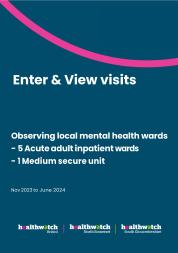Forward thinking - research on support for people with severe mental illness

They also face distinct inequalities when it comes to their mental and physical health, both in terms of having timely access to evidence-based mental health treatment and a experiencing a greater likelihood of poor nutrition, obesity and smoking-related diseases – all of which can and do contribute to premature mortality.
Our intention is to change this as we implement the Five Year Forward View for Mental Health. With significantly increased investment in both the mental and physical health of people with SMI, we aim to not only help people with SMI quickly access evidence-based, NICE-concordant mental health care; we also want them to access NICE-concordant physical health care, to secure gainful and meaningful employment and for services across a range of sectors to work together to help improve their clinical and social outcomes in such a way that they have the same opportunities to live healthy, full and fulfilling lives like anyone else.
In our view, we can no longer accept women and men with SMI struggling to access the high-quality care and support they ought to receive during their lifetime and dying 15 to 20 years before they should.
The findings set out in this useful research review will support this drive to improve care – and, indeed, lives – and we commend the report to you.
People with severe mental illness (SMI), like schizophrenia, often experience poorer health and die sooner than others. Access to services may be patchy and care is not always well coordinated. But with the right care and treatment, and knowing what kind of support is needed, people can live well with these conditions. Mental health is now a recognised priority for policy and service, with research playing an important part in delivering best care.
This review features 30 published studies funded by the National Institute of Health Research (NIHR) and additional examples of ongoing research. These should be read alongside published clinical guidelines for services and treatments.
SUPPORTING EARLY DETECTION AND INTERVENTION
Identifying people with psychosis and starting the right treatment without delay leads to better outcomes. A large trial of over 50 GP practices showed the impact of an educational intervention for GPs in improving identification and referral rates for young people at risk of developing psychosis. However another trial of a community awareness programme showed no effect in improving early referral rates.
Avoiding delay
A small trial comparing a public health campaign to raise awareness of psychosis in the local community and improve knowledge of early warning signs showed a significant reduction in delay in untreated psychosis compared to areas without this intervention.
CRISIS CARE: LOCATION, SETTINGS AND PRACTICES
Developing alternatives to hospitals
People experiencing mental health crises need expert and prompt support. A recent review found a lack of high quality evidence overall for models of mental health crisis care. What research there is suggests that crisis resolution teams in the community are more effective than inpatient care for many outcomes. Alternatives to hospital stays for mental health crises include crisis houses and acute day hospitals which appear as clinically effective as inpatient treatment and are largely preferred by those using crisis services. Research has explored the nature of therapeutic relations in crisis houses and why users tend to be more satisfied with these services.
Improving care on inpatient wards
For people needing hospital care, research has looked at different approaches to managing disturbed behaviour, from seclusion to transfer to specialist units. One study found variation in practice, and supported prioritising therapeutic over coercive interventions.
EVIDENCE HIGHLIGHTS AND QUESTIONS TO ASK ABOUT YOUR SERVICES
NIHR Themed Review: Forward Thinking 5 in nine hospitals evaluated a package of evidence- based interventions (Safewards) to help staff manage flashpoints and improve safety in acute psychiatric wards. This was shown to be effective in reducing conflict and containment, such as the need to sedate patients. A study looking at the acceptability of locked ward doors to staff and service users found that the evidence was inconclusive in terms of locked doors reducing absconding and self-harm.
Caring for young people
Other studies have looked at services for children and young people, important given that most severe mental illnesses start before adulthood, although SMI is very rare in children and young people. Should children and young people be admitted, one review stressed the importance of young people being allowed to lead as normal a life as possible, to make it easier to adjust to leaving hospital.
STABILISING, MANAGING PHYSICAL & MENTAL HEALTH
Staying well
We know that preventing relapse and recurring psychotic episodes is important to long term health. A programme of research explored different approaches to keeping well in the first few years of illness, from therapeutic efforts to lifestyle change, but none of the interventions showed any significant effect. Another important aspect of keeping well is having regular medication, including injectable antipsychotics, but adherence can be poor.
Planning future care
Family involvement in care planning can lead to better outcomes for people with mental illness such as fewer inpatient admissions but this is often not implemented in mental health organisations. One study concluded that involving families in care plans may require a cultural and organisational shift towards working with families.
SUPPORTING RECOVERY, SELF-MANAGEMENT AND ENGAGEMENT
Recovering better health
New approaches to mental health care focus on recovery, with individuals taking control and setting goals for themselves that are meaningful to them. A study of NHS rehabilitation services showed that quality of care was positively associated with service users’ autonomy, experiences and perceptions of therapeutic care. Vocational rehabilitation has been shown to be effective but has been poorly implemented.
Using technology
Digital technology is changing the way people with SMI seek information about their illness. One trial found that web-based interventions may prove an important, inexpensive, feasible, and acceptable step forward in creating a choice of evidence-based interventions at different stages of recovery. An evaluation of interventions to train people with schizophrenia to recognise early warning signs of psychosis showed some positive benefits.
Getting support from peers
The use of peer workers is an interesting new development, with benefits and some challenges for organisations. Research highlights the importance of keeping this as a distinct role and contribution. Another study suggested that more effort should be directed to support people with severe mental illness to build and maintain their personal networks.
Downloads
Download the full report below

